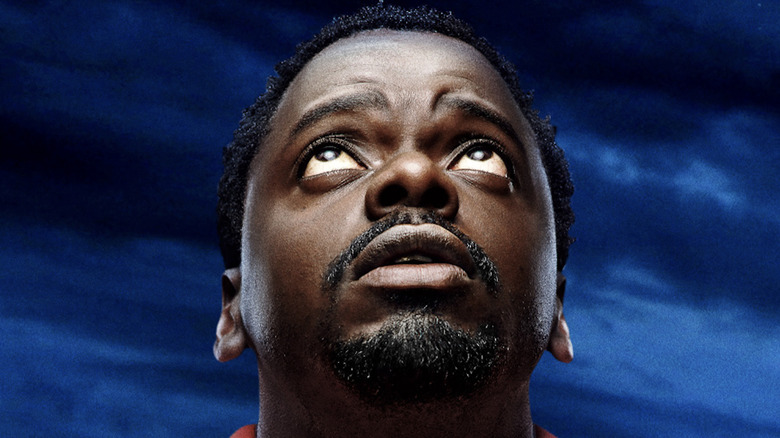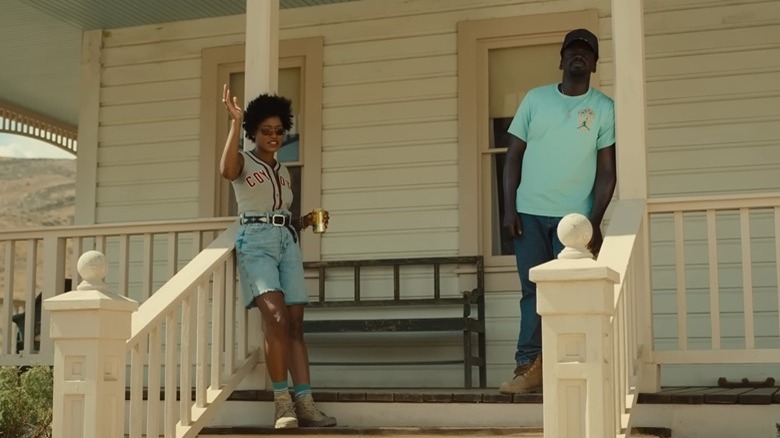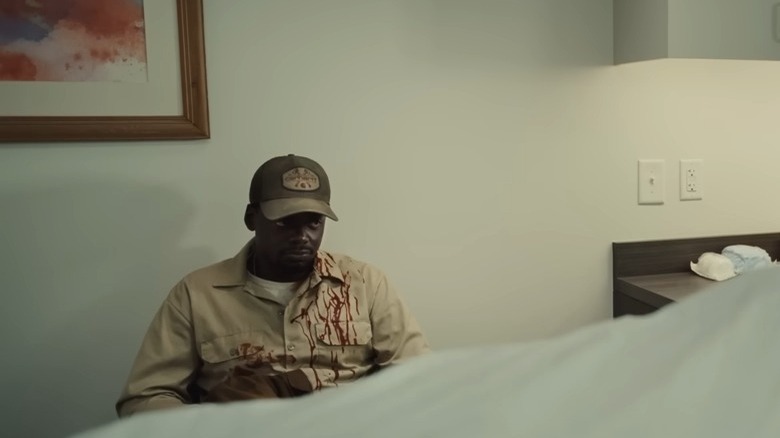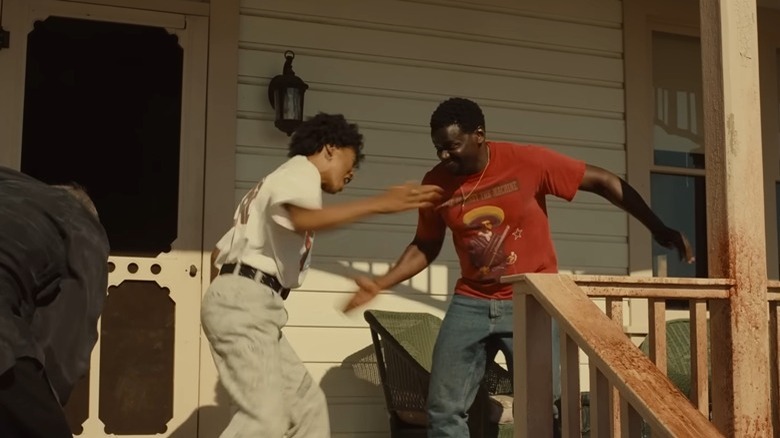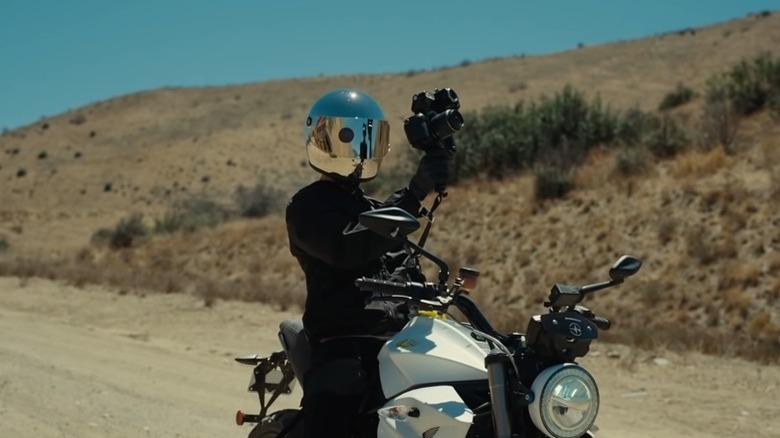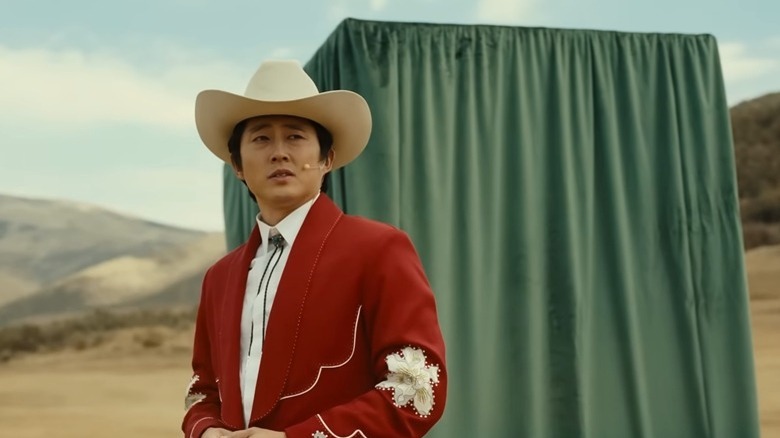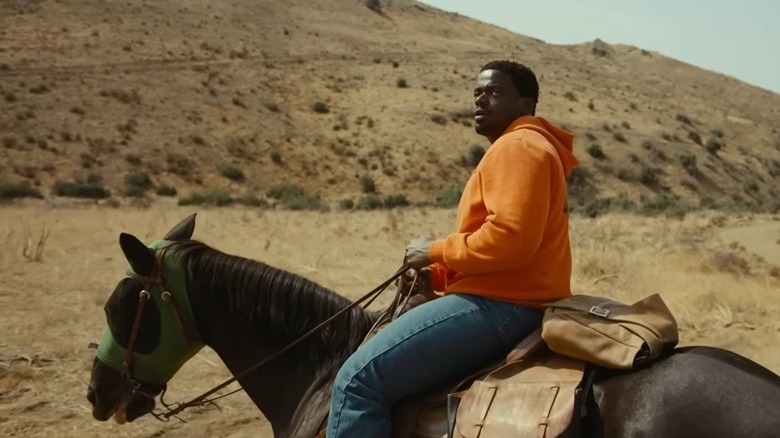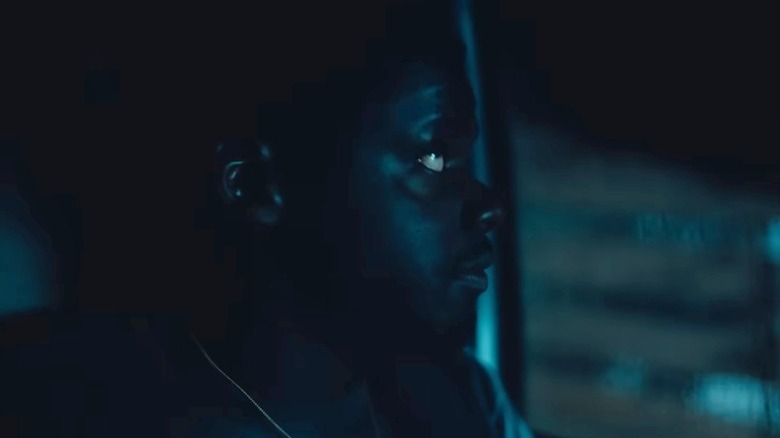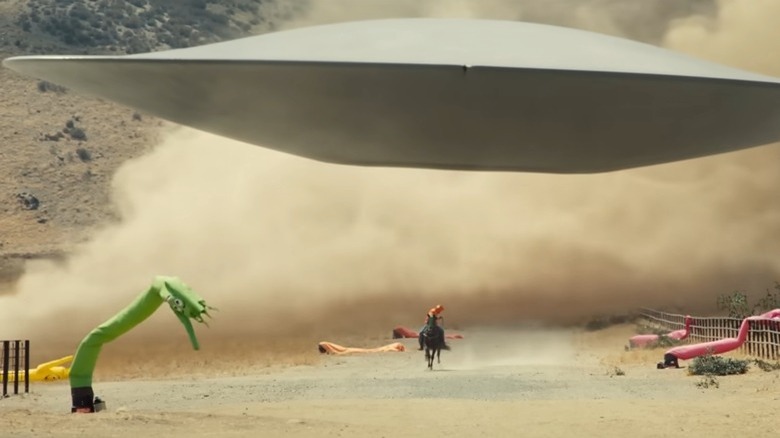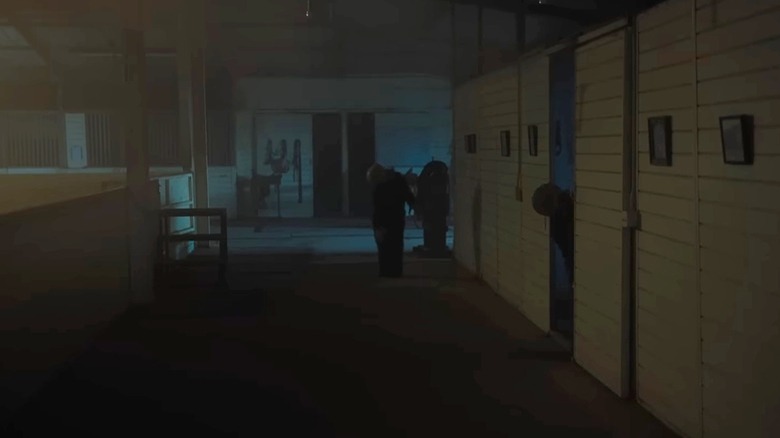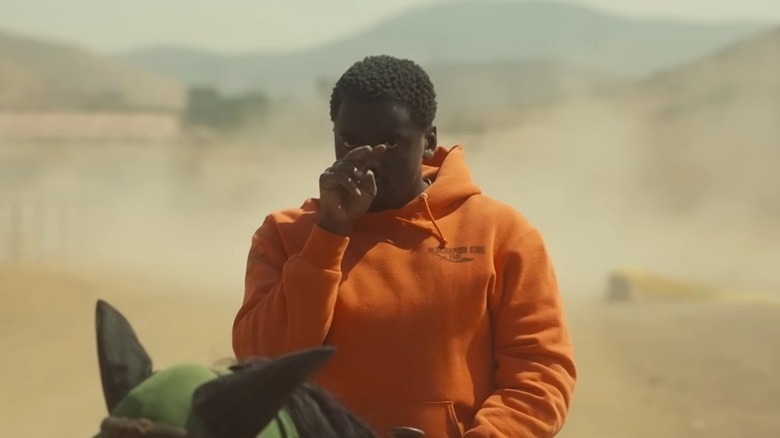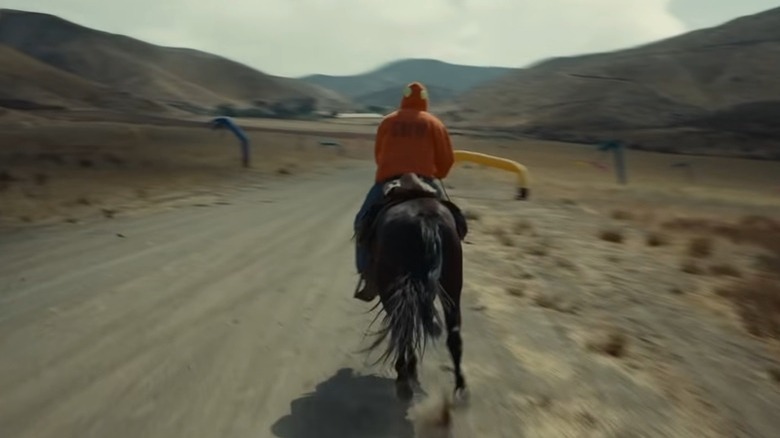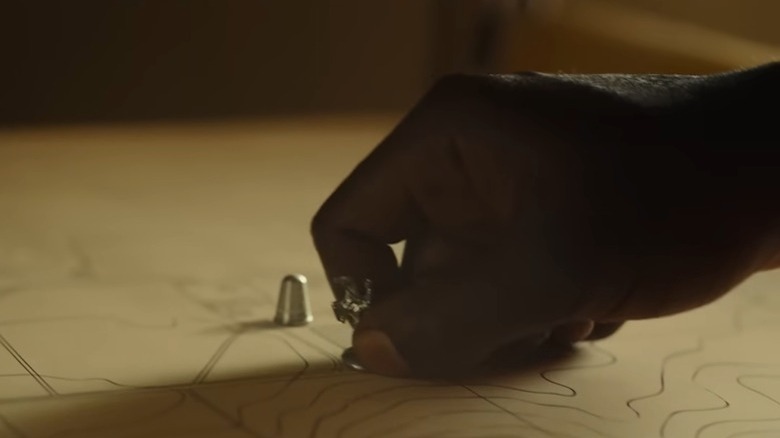OJ Haywood's 12 Best Moments In Nope Ranked
The third film from writer/director Jordan Peele just might be his most audacious. If you haven't seen it yet, you'll want to uncover all the terrifying moments involving threatening skies, malevolent monkeys and flying horses for yourself. If you have, however, you're likely already a fan of OJ Haywood, the "Nope" character who anchors it all with am incredulous, methodical calm in contrast to the chaos around him. It's a great performance from Daniel Kaluuya, who previously collaborated with Peele on 2017's "Get Out."
OJ comes from a Hollywood-adjacent family that has long made its living supplying trained animals (primarily equines) for film productions. After his father's tragic death, he and his more-outgoing-but-unreliable sister Em (Keke Palmer) begin working more closely in an attempt to save the family business ... and increasingly, figure out what the heck is going on above the skies of their inland California ranch.
Following encounters with a cultish child star-turned-amusement-park-host (Steven Yeun), an overeager Fry's electronics employee (Brandon Perea) and an enigmatic cinematographer determined to get the perfect shot (Michael Wincott), what begins as basic self-preservation evolves into a plan to make hundreds of thousands of dollars, save the ranch, and perhaps get some small measure of comeuppance on an industry that has exploited and marginalized Blacks since its first captured image.
The result is a frightening, off-puttingly funny movie about how the exploitation of people and animals for show business can create lingering pain, and even death. But as the film grows wider in scope and more chaotic in action, at the center of the maelstrom remains OJ — thoughtful, stoic, and preparing for what's next. Below are some memorable (and spoiler-heavy) OJ moments that define the "Nope" character.
Sibling Antics Last A Lifetime
Months after their father's death, OJ and his sister Em struggle to keep the business afloat. Well, OJ is. Em comes and goes. After an especially disappointing afternoon involving losing a job and having to sell more horses to their neighbor Jupe (Yeun), Em decides to crash with her brother for the night.
As they head up from the barn to the main house, Em runs up behind OJ, attempting to catch him unaware. Hearing her coming, he easily dodges her attack. The reaction prompts her to compliment him for still having good reflexes before jogging on ahead. The exchange erases a day's worth of simmering tension. Whatever difficulties the two are having drain away — at least, for now.
It's a simple moment, but it speaks volumes about both the present state of their relationship and their past. Until now, OJ has spent most of "Nope" in various forms of unhappiness. The only time he seems anywhere close to happy or relaxed happens in the brief moment before his father's (Keith David) death by falling debris. And, even then, he's not exactly gregarious.
This brief flash of sibling horseplay (no pun intended) reveals an OJ who at one time embraced such moments of frivolity, suggesting a far lighter brother-sister relationship in the past.
Silent Still Suffering
The first hints of things going awry in the present-day world of "Nope" seemingly come out of nowhere. A brief hail of foreign objects — coins, keys, rings — pour down on the farm. A coin strikes the family patriarch, Otis Sr. (Keith David), penetrating his eye and piercing his brain. While he does not initially die, he succumbs to his wounds as OJ rushes him to the hospital.
In the following scene, OJ sits in a sterile doctor's office, surrounded by white walls, bland art, and generic cabinetry. His father lies on a gurney in front of him, covered by a white sheet. OJ's facial features remain flat, betraying no sign of his emotional experience. Only the blood all over his clothes betray the day's events.
And yet, the way Kaluuya holds down the scene lets the enormity of his pain fill the frame. OJ is dragging every ounce of emotion into himself, crushing it down, denying its release. Somehow, the pain still comes off him in waves, though. It's a master class in body language and the power of the eyes by Kaluuya. It tells the viewers exactly how OJ interacts with the larger world when encountering hardship, hinting there's so much more going on under that silent surface.
The Secret Handshake
If Em's attempt to catch her brother by surprise while walking home gives viewers a glimpse of the "old" OJ, this moment is a full-bore grand unveiling of their shared bond. On the eve of enacting their plan to get the Jean Jacket "Oprah shot," such an acute sense of excitement seizes OJ that he can't help but share a rapid succession of high fives with his sister. It is loud and swift but unmistakable. It's also the first sign of any kind of joy we've seen from OJ.
It is instructive about who OJ was and is. However, it is also revealing about his relationship with his sister. How he turns to her to celebrate without hesitation or restraint speaks to an instinct. It's, perhaps, been dormant for some time, but it is clear how deeply it was embedded in him and how strong that connection remains.
Trying to Save Those Who Won't Save Themselves
The arrival of the mirror-helmeted "TMZ Guy" (Devon Graye) is a shocking reminder to both the Haywoods and the audience that a world exists beyond their farmstead. Jupiter's Claim may be little more than a local curio, but an entire park's worth of people disappearing into thin air is bound to catch the media's curiosity. The man on the motorcycle is a harbinger of things to come.
Unlike the Haywood team, he has no plan beyond "show up and see what happens." This ends up with the man on his back, badly injured, and directly in the feeding path of "Jean Jacket," aka the UFO. OJ refuses to leave TMZ Guy there, though. It might cost him his life, derail the plan, or both, but OJ has to intercede.
But in speaking with the man, the film shows OJ stumbling. A profoundly introverted man, OJ struggles to even talk to the paparazzi, never mind convince him to get out of harm's way. Perhaps the photographer never stood a chance; perhaps even the most well-spoken plea couldn't save him.
What's clear is OJ can't muster up the right words, no matter how heroic his natural impulses. That limitation, one OJ is clearly aware of, only makes their interaction more powerful. Every impulse in OJ would've been pulling him away, telling him to stay still, to keep quiet, and to stick with the plan. Instead, he rejects them all for another person, remaining there trying to save him until it's too late.
Honoring His Commitments
To keep the ranch financially solvent, OJ has been slowly selling off his family's stable of horses to Jupe. The latest transaction involves Lucky, a horse that seems to be a favorite. Unfortunately, Lucky's skittishness around eye contact and mirrored objects lost the ranch a job. That money needs replacing, somehow.
After selling Lucky, OJ realizes the true reason Jupe has been so anxious to buy Haywood horses at fairly generous terms despite knowing the ranch's financial predicament is because the former child star isn't using them to add verisimilitude to his Western-themed amusement park — he's feeding them to the alien, with plans to use the spectacle as a sort of sideshow.
OJ heads to the park after Jean Jacket's latest visit, hoping to save his former horse. Lucky, of course, has survived the experience thanks to his previously-established distaste for eye contact. With Jean Jacket still circling, OJ rushes in to free the trapped equine. Unfortunately, he makes his move too soon, and only the amusement park's stadium tunnel saves him from being ingested by the extraterrestrial.
Besides an act of impressive heroism, OJ's actions affirm how important his horses are to him. Yes, he is running a business with them, but he's clearly attached enough to risk being snacked on by a being from beyond the stars.
The Hero Shot
At the conclusion of "Nope," Em successfully vanquishes the alien with a trick that may remind viewers of a certain shark's demise. She also appears to have secured the "Oprah shot" thanks to the amusement park's well camera, a coin-operated, cranked machine that requires no electricity to work. All that remains unresolved is OJ's fate.
As the local officials and press begin to swarm the amusement park, Em spies someone at the opposite end of it. Partially masked by fog and dust, the sight takes a moment before it becomes clear. When it does, there sits her brother OJ, astride a horse. For a film that has, at least partially, been about the forgotten Black jockey in one of film's earliest images, it closes the loop. The Black cowboy is no longer an ancestor largely erased by history. Instead, it's her brother as a hero in present day.
Some theories on the ending of "Nope" complicate this final image, but only a bit. Regardless of whether you take the image at face value (OJ survives and gets his hero moment) or the popular counter-theory (OJ has died, and Em is either imagining him or catching a glimpse of something from beyond the veil of this world), the message remains the same. The Haywoods have once again asserted their place in history, even if they're the only ones who recognize it.
Checking The Locks
Sometimes an extraordinary moment doesn't have to be one of deep insight or powerful heroism; sometimes, all it takes is simple comedic timing.
After surviving his encounter with Jean Jacket and recovering enough to load Lucky into the horse trailer to return the horse to the Haywood ranch, OJ finds that the alien has not just settled back behind a cloud for its next feeding. Full of inorganic material it can't process and seemingly irritated with either OJ or Lucky's ability to evade being eaten, Jean Jacket has continued to sweep the sky above. Then, either by coincidence or in an act of admirable pettiness, the extraterrestrial regurgitates the "decoy" horse, sending it crashing through OJ's windshield.
After the shock, OJ quickly drops the manual lock on his truck's driver-side door. The move is a deeply fruitless gesture. The vehicle is immobile due to Jean Jacket's EMP wall, and a lock certainly won't stop the creature from gobbling up OJ if that's what it decides to do. It is also a wonderfully funny reaction, one that feels very human.
What's In A Name?
In the annals of alien names, Jean Jacket will likely stand out as one of the stranger choices. It is also one of the most personal.
Earlier in "Nope," before the Haywoods set their sites on capturing an image of the extraterrestrial invader, the siblings discuss their recently deceased father. Em begins to recall a horse named Jean Jacket, originally intended to be the horse she would learn how to train for show business work. The family landing a job with the film "The Scorpion King" derails that plan. While never stated outright, the implication is Em never truly felt invested in becoming a horse trainer after that. That's why she has so many side jobs and acts as an infrequent family business hypewoman instead of working more formally with her father and brother.
Thus, Jean Jacket was the catalyst for both the siblings' drifting apart and forming their very different personalities. Em became gregarious and outgoing but also prone to doing her own thing without concern for the family. On the other hand, OJ became serious and deeply involved in the family business, closing himself off to big expressions of emotions or flights of fancy.
By naming the alien Jean Jacket, OJ makes the creature a new turning point for him and Em. Jean Jacket, the horse, divided their family. Jean Jacket, the extraterrestrial, is their chance to come back together.
Close Encounters of the Fist Kind
In another example of filmmaker Jordan Peele's impressive ability to balance fear and humor, OJ discovers the barn lit up and the interior horse trainer running in the middle of the night. Somewhat suspicious, he heads out there. Seemingly finding nothing, he turns everything off. When he's several feet away from the switch, everything turns on again. Moments later, two creatures emerge. Furry, wide-eyed, and silent, they begin to move toward the horse trainer slowly. A third swings in from an open door, prompting OJ to level whatever it is with one punch.
It is a hilarious moment of catharsis, the sort of thing viewers have spent years wondering about aloud. If an alien approaches you in the dead of night, making you feel terrified and cornered, why wouldn't you throw hands for your life?
OJ's reaction only gets funnier when it turns out the aliens are actually Jupe's kids in costumes, playing a prank on their overburdened neighbor because Em stole one of their horse statues earlier that day. Imagine going from terrified to briefly triumphant before ending up with the knowledge you just punched a child in the face.
Eyes On Me
It's a simple gesture, typically conveying the vaguely intimidating sentiment of "I'm keeping my eyes on you." However, in the movie, it takes on a deeper meaning. For OJ and Em, it affirms their bond to one another.
In "Nope," it first comes up when Em, as a child, is watching her father and brother taking Jean Jacket (the horse) to the "Scorpion King" set. OJ sees his sister watching and likely realizes she's disappointed about losing out on training her first horse. But, just a kid himself, there isn't much he can do to change things. So he points to his own eyes and then back to her. It is a gesture of affirmation, "I see you, and I know you're sad."
In the context of the present day, OJ makes the gesture again as the siblings poise ready on either side of Jean Jacket the alien. It becomes a gesture of encouragement and trust at that moment. He's still confirming he sees her, but it isn't about her emotions this time. After grumbling at her earlier for her lack of commitment to the family business, and perhaps the family itself, the gesture is an apology. This time, he's saying, "I see you, I know how much you care about me, and I trust your abilities." Beginning with Em testing his reflexes, moving through their multiple slap high five, and ending here, it is the confirmation of their rebuilt bond.
Off To The Races
While the plan to capture Jean Jacket has several moving parts, the keystone hinges on OJ drawing the alien out and evading the creature long enough to tire it out without ending up in its digestive tract. It seems a simple enough task, in general, but in practice, it is anything but.
OJ must ride fast enough to stay ahead of Jean Jacket, but not so fast as to lose the alien's interest. He needs to keep the alien visible long enough to give Angel (Perea) and Antlers (Wincott) plenty of time and angles to get the shot they need. He then needs to ditch Lucky and the hoodie that makes him look like he has eyes in the back of his head close enough to shelter that he can run there and hide before the alien gobbles him up.
Ultimately, it gives the audience an opportunity to appreciate OJ's physical skills when it comes to horses. For the first time, viewers see the horse trainer open up and get a horse to move for him, rather than small bits of training like how to handle a reflective surface or cope with loud noises. There's so much danger in the moment, but there's also something arresting and joyous about OJ — and Lucky — finally having a reason to run free.
Anything Can Be Trained
OJ determines that Jean Jacket is acting like a creature, trying to express dominance of its territory. he then employs his lifetime of training to avoid the alien's ire, averting his gaze when it is near and realizing if the extraterrestrial acts like an animal, chances are it can be "broken" — or trained — just like one of OJ's horses.
This is a chance to see the humble, on-his-heels OJ suddenly in his element. Freed from peripheral concerns about getting along with people on set or figuring out finances, he can concentrate on being the smart, intuitive trainer he is. It's what he practiced for most of his life before his father's death.
It also reinforces how OJ is different from Jupe, despite both seemingly wanting to cash in on this living being. Jupe, essentially, saw Jean Jacket as a special effect that he could bribe and control with food. He didn't need the alien to live or provide for his family. He just wanted to use it to regain the spotlight.
OJ, in contrast, recognizes that Jean Jacket is a living being worthy of respect. He understands it has its own desires and instincts and only seeks to direct them briefly to save his family's business, not subvert them to force the alien into a glorified sideshow attraction.
